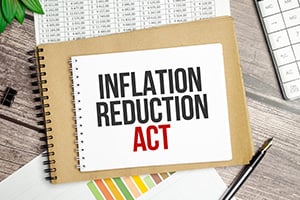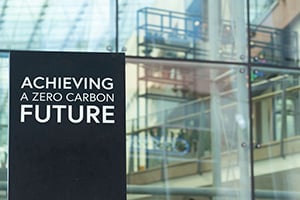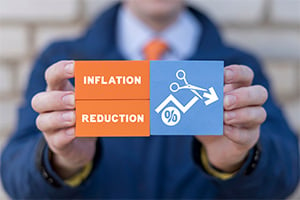By Brian Bollinger – Head of Communications at GBH
Sustainable Investment Group (SIG)
 In the ever-evolving world of sustainability and technology, businesses, led by forward-thinking Sustainability Directors, CFOs, and Facilities Managers, are at a crossroads. Embracing innovation and adapting to changing consumer behaviors is not just a strategic move—it’s a necessity. At Sustainable Investment Group (SIG) we want those we serve to be at the edge of that innovation. This post delves into the current and emerging trends that we at SIG are seeing reshape approaches to sustainable business strategy.
In the ever-evolving world of sustainability and technology, businesses, led by forward-thinking Sustainability Directors, CFOs, and Facilities Managers, are at a crossroads. Embracing innovation and adapting to changing consumer behaviors is not just a strategic move—it’s a necessity. At Sustainable Investment Group (SIG) we want those we serve to be at the edge of that innovation. This post delves into the current and emerging trends that we at SIG are seeing reshape approaches to sustainable business strategy.
1. Technological Innovations in Sustainability: The advent of Artificial Intelligence (AI) and Machine Learning is revolutionizing how we manage resources. AI’s application in smart grid technologies is enhancing energy efficiency at an unprecedented scale. For Facilities Managers, this means optimized operations and significant cost savings. Additionally, the advancements in renewable energy technologies, particularly in solar and wind energy, are making these options more economically viable than ever before. A consultant on the ESG team at SIG, Amanda Howard, notes that “in a race to decarbonization, many companies are turning to renewable energy to reduce their GHG emissions.”
2. Shifting Consumer Behaviors: With each passing year consumers are becoming more eco-conscious (and eco-competent), demanding products and services that align with those values and pass increasing scrutiny. This shift is pushing companies to adopt green practices and offer sustainable solutions. The sharing economy of the past 10 years, characterized by models like car-sharing and co-working spaces, is redefining the concept of ownership, emphasizing sustainability and community. Strategies that give companies access to sustainable spaces rather than ownership of them will increasingly drive corporate and consumer preferences. Exceptions to this will often be driven by tax incentives that only benefit owners, but even those appear to be trending towards downstream flexibility (e.g. at the counter tax credits for EV leases).
3. Economic and Environmental Impacts: In the realm of finance, green bonds and ESG investing are no longer niche; they’re part of a broader, responsible investing trend. For CFOs, this means aligning investment strategies with sustainability goals. Globally, the introduction of carbon pricing mechanisms is setting a price tag on environmental impact, incentivizing businesses to lower their carbon emissions. Howard added that “in the past few years, we have seen carbon emissions tracking move from an investing trend to a government requirement in many places. This has forced companies to confront figures they may find unsettling. As a result, there has been a surge in green financing.” (see this recent blog by SIG’s VP Climate Investment Solutions, Monte Hilleman)
4. Reshaping Business and Society: Corporations are increasingly embedding sustainability into their DNA. This means not just short-term CSR projects but long-term commitments to sustainability, influencing everything from supply chains to employee engagement. Policies and regulations are evolving in tandem, setting new standards for corporate environmental responsibility. I spoke with Steví Greene, Sustainability Consultant at SIG, who shared the following insight:
“Trends in the LEED certification market are reflecting a profound shift towards holistic environmental stewardship. There’s a noticeable surge in demand for LEED certification as organizations increasingly prioritize eco-conscious building practices. We’re witnessing a pivotal moment where the focus is not only on energy efficiency but also on health and wellness, resilience, and regenerative design. This marks an exciting trajectory where the market is embracing a more comprehensive approach to sustainability, ensuring a brighter, greener future for generations to come.”
5. Consumer Expectations and Societal Norms: The demand for transparency in sustainability efforts is at an all-time high. Consumers and investors alike want to see genuine, impactful actions. Furthermore, sustainable living is gaining traction, not just as a trend but as a societal norm in corporate circles, influencing business purchasing decisions and lifestyle choices. SIG’s Senior Energy Manager, Jeff Stewart, shared his observation that “More and more municipalities and private companies are pushing for not only energy efficiency practices/policies but for GHG reduction practices/policies when the net energy cost savings may not be large.”
6. Future Perspectives: Technological advancements in 2024 promise to further streamline sustainability efforts, with a hefty tailwind gusting behind any of the forthcoming rate drops delivered by the Fed in 2024. However, the role of policy in shaping these advancements cannot be understated. Education, too, will play a crucial role in fostering a culture of sustainability, especially as we prepare future generations to tackle environmental challenges.
For Sustainability Directors, CFOs, and Facilities Managers, staying abreast of these trends is not just beneficial—it’s essential for driving sustainable growth and success. As these trends continue to evolve, they offer opportunities for innovation and strategic development in the sustainability sector.

Brian Bollinger is the Head of Communications for SIG’s parent company, Green Building Holdings (GBH). He enjoys serving the organization by furthering its mission of creating a healthier and greener world, while also equipping the green building industry with cutting edge education, solutions and innovative tools for success. Reach out to Brian here.
MBA, Certified Energy Manager, LEED Green Associate, WELL AP
Atlanta, GA
© 2023 Sustainable Investment Group (SIG). All rights reserved.



